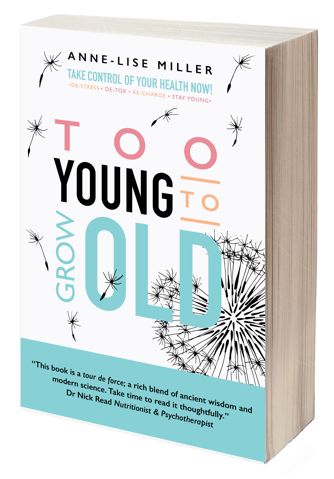Christmas is the time of cheers after all and alcohol is the traditional social lubricant and celebratory symbol of choice. But what about those toxins I hear you say?
Alcohol is a complicated subject because it is toxic. But how toxic varies considerably depending on the type, the amount and what it is combined with. Also relevant are the state of the bowels, the kidneys, the liver and the nutrient status of the individual.
The good news is that with so many variables to influence, it is possible to improve your body’s resistance to alcohol.
 The problem is not the fall but the landing, another word it’s not the drinking but the ensuing circulating poisons that are damaging. By ensuring good detoxification the negative effects of alcohol can be substantially controlled.
The problem is not the fall but the landing, another word it’s not the drinking but the ensuing circulating poisons that are damaging. By ensuring good detoxification the negative effects of alcohol can be substantially controlled.
|
To start with we are not all born equal when it comes to processing alcohol. In fact there is even a theory which postulates that people of occidental descent are generally more tolerant to alcohol because they have genetically evolved in the presence of alcohol. The traditional drinks of choice were beer, cider and wine because water was not clean and fruit juices had to be fermented in order to be preserved. Conversely, people of oriental descent favoured tea and boiled their water to make it potable. This means that they have not had the benefits of a long genetic evolution to tolerate alcohol and it is generally observed that individual of Asian and Indian ancestry are more sensitive to alcohol and less tolerant to even small amounts. |
The symptoms of hang-over and alcohol toxicity are evidence of the ravages to the precious tissues of the gut, the liver and the nervous system cause byalcohol. They are: headaches, noise and light sensitivity, irritability, digestive trouble, diarrhoea, nausea and fatigue. Long term damages are associated with diabetes, liver disease, pancreatitis, Alzheimer disease, certain cancer, cardio-vascular disease, depression and sleep disorder. |
If you are drinking (organic) red wine (especially burgundy, Shiraz, Cabernet sauvignon or merlot) and champagne/champagne-like wines made from Pinot noir grapes, you are benefiting from a healthy dose of polyphenols, not least of them Resveratrol. Resveratrol is a powerful anti-oxidant with neuro-protective and anti-aging properties. The polyphenol s found in wine and champagne are amongst the chemicals commonly associated with the “French paradox”. This refers to the fact that, despite a lot of eating and drinking, the French don’t seem to suffer as many heart diseases as their north-European counter-part who tend to drink more spirits/beer and less wine. But the French paradox will have to be the subject of a whole different newsletter…
So here is my step by step guide to no-tox drinking that will keep you dancing well into the New Year.
• Take Milk thistle before during and after drinking. Milk thistle is a great liver support that helps detoxification by slowing down intermediate Phase 1 to phase 2 metabolites which are damaging (oxidative stress). The process of alcohol detoxification is regulated by a steady supply of liver detox enzymes and chemical reactions. As long as the pace of drinking is match by the detox pathways inherent ability to do so, all is well. This is a 3 steps process: phase 1(the biotransformation by enzymes cytochrome P450); phase 2 (the conjugation of the metabolites coming out of phase 1 to render them water-soluble) and the elimination out of the body via the bowels and the kidneys. Jamming can easily occur and one of the main objectives when controlling the potential damages linked to alcohol drinking is to improve the rate of detoxification and elimination to prevent accumulation of poisons and recirculation. Use milk thistle tincture and spread the dose through the day. Do not exceed 100 drops per day
• Avoid binge drinking by alternating with glasses of water and spreading your drinking. Binge drinking (drinking a lot in a very short time) is clearly not going to match any detox rate. If your intention is to get drunk as quickly as possible then you are unlikely to be interested in damage control anyway!
• Avoid drinking on an empty stomach. Here again an empty stomach means very fast absorption rate and poisons jamming along the detox gateways. Snack foods that are particularly helpful to slowdown absorption without contributing further poisons are nuts, seeds (humus), raw vegetable sticks, and avocado (guacamole). Do limit consumption of salted nuts as this will only make you thirstier.
• Avoid combining alcohol with sugar especially fructose (concentrated in fruit juices and high fructose corn syrup in soda pops). Fructose has an energetic pathway similar to alcohol. They both result in the bio-synthesis of fat which deposits in priority in and around the liver. Avoid doubling up those negative effects
• Boost your glutathione intake by eating asparagus, avocado, and walnuts. Glutathione is one of the major phase 2 antioxidant that neutralises alcohol. Glutathione is unstable and destroyed by cooking so eat plenty of raw vegetables
• Take N-acetyl-cysteine. NAC is a common supplement that is a precursor for glutathione but a lot more stable. You can divide doses throughout the time that you are drinking and for that purpose it is better to find a low dose (100mg) supplement. This is a very powerful way to improve alcohol detoxification and you can take a capsule with every drink.
• Lipoic acid, vitamin b’s and magnesium are all co-factors for alcohol detoxification make sure that you are not deficient by taking a good multi vitamin. In addition dead-sea salt baths are a great way to boost magnesium levels
• Don’t mix alcohol with paracetamol and steroids (not just antibiotics!) they seriously interfere with the detox process. Fried and burnt foods have similar effects
• Make sure that you are not constipated. Detoxification is complete only once all has been take out of the body. You bowels is a major route of elimination.
• Have a colonic hydrotherapy treatment to stimulate both detoxification and elimination. In addition colonic can be used to stabilise the gut flora. The toxins produced by the bad bacteria in the bowel (LPS) have been shown to contribute considerably to the damaging effects of alcohol on the liver and the development of (alcohol induced) liver disease.
A colonic is also the quickest way to treat a hang-over!
Wishing you all a very happy Christmas and New Year


